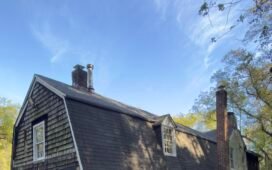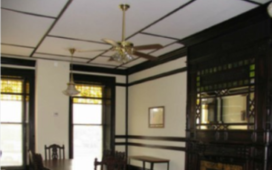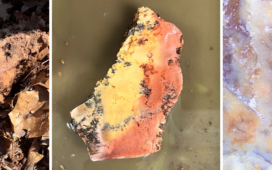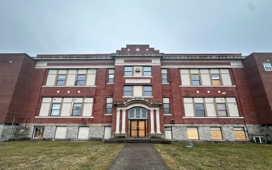by Heather Barrett, Administrator of Architectural Research
MHT is excited to announce the FY2025 recipients of our Historic Preservation Non-Capital grants! Funded through the Maryland Heritage Areas Authority Financing Fund, this grant program supports a wide variety of research, survey, planning, and educational activities involving architectural, archaeological, or cultural resources.
This year, a total of $300,000 is being awarded to non-profit organizations and universities for a diverse slate of nine projects across the state. Below are descriptions of all the projects awarded:
Maryland LGBTQ Heritage MPDF and National Register Nominations – Baltimore Heritage, Inc. ($30,600)
Building upon a previously completed historic context study, this project will produce a Multiple Property Documentation Form (MPDF) for LGBTQ history in Maryland, one new National Register nomination for an individual resource in Baltimore, and updates to three draft National Register nominations in Baltimore for Leon’s Bar, the Chase-Brexton Building, and Monumental Elk’s Lodge #3.
African American Historic Resources of Southern Maryland National Heritage Area – Tri-County Council for Southern Maryland ($58,000)
This project will research and document historic resources associated with African American heritage in Southern Maryland. The project includes a National Register MPDF, one supporting National Register nomination for an individual resource, and approximately five to seven Maryland Inventory of Historic Properties survey forms. Results of the project will be shared via a public presentation.

Infusing Archaeology in Education to Cultivate Authentic Inquiry – Towson University ($38,000)
This project will result in a multi-day workshop for K-12 school teachers, to be held at North Point State Park, which will include hands-on archaeological experience in fieldwork, in the lab, and in the classroom. Teachers will receive Continuing Professional Development (CPD) credits from the Maryland State Department of Education upon completion of the course requirements. This will build a cohort of teachers who can support their local professional archaeologists through responsible classroom activities.
Documenting Baltimore’s Laurel Cemetery on the NRHP and Our Website – Laurel Cemetery Memorial Project, Inc. ($15,000)
Project work includes the preparation of a National Register nomination for Laurel Cemetery, Baltimore’s first nondenominational cemetery for African Americans, founded in 1852. Additionally, this project will include continued cemetery research, burial database digitization, and two public walking tours.
GPR of Fort Cumberland, Wills Creek Museum/Emmanuel Episcopal Campus – 28 Washington St., Inc. ($18,000)
This project will contract with a ground penetrating radar (GPR) specialist to conduct a non-invasive archaeological survey to locate and characterize buried cultural remains in open areas under lawns, parking lots, sidewalks, and roads near the Emmanuel Episcopal Church property in Cumberland, Maryland. Such survey work will hopefully document subsurface archaeological features and deposits that may relate to the 18th-century Fort Cumberland, as well as subsequent use of this site.
Documenting the Modern Structures of the Maryland Park Service – The Society for the Preservation of Maryland Antiquities, Inc. (aka Preservation Maryland) ($60,000)
This project will involve a survey of Cunningham Falls, Greenbrier, Gunpowder Falls, and Patapsco Valley State Parks, focusing on structures built between 1950 and 1980 in the distinctive Park Service Modern style. Project work includes hiring a consultant to prepare approximately four to six Maryland Inventory of Historic Properties forms and a historic context/survey report.
Keyser Complex Chronology Project – The College of William & Mary ($30,000)
This project seeks to vastly improve the known chronology of the Late Woodland period of the Potomac River valley as it relates to the Keyser Ceramic complex. The work will: generate a large body of new radiocarbon dates and statistical chronological models for the occupation of key sites in Maryland; use ceramics to evaluate the movement of people and goods between communities; and produce an analysis of historic drought data across different locations in the study area. The result will be a model that illustrates the interconnection of climate, the exchange of goods, and occupation chronologies in the waning years of the Late Woodland period of Maryland.
Enhancing the Social Context of Historic Sites – Sandy Spring Museum ($30,400)
Building on an archival project focusing on Black history, this project will update documentation in the Maryland Inventory of Historic Properties on historic resources in the Sandy Spring area to include a broader social context and the contributions of African Americans. Project deliverables include approximately seven Addendum forms for selected properties.
Archaeological Investigation of 18WO220, South Point Site – Beach to Bay Heritage Area, Inc. ($20,000)
This project will support fieldwork at the South Point Site (18WO220) in Worcester County, which is actively diminishing in size due to erosion and climate change. Work will include mapping and describing the extant midden and any other features found at the site, as well as conducting excavations of the precontact midden and features to salvage archaeological data from the site before it succumbs to erosion and sea level rise. A detailed technical report will be produced describing all work.
Availability of FY2026 funds through the Historic Preservation Non-Capital Grant Program will be announced in late spring of 2025 on MHT’s website ( https://mht.maryland.gov/Pages/funding/grants-noncapital.aspx). Application deadlines and workshop dates will also be found on this page at that time.
For more information about the grant program, please contact Heather Barrett, Administrator of Architectural Research at MHT, at 410-697-9536 or heather.barrett@maryland.gov or Matt McKnight, Chief Archaeologist, at 410-697-9572 or matthew.mcknight@maryland.gov. For information about organizations receiving grants, please contact the institutions directly.























